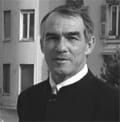It is certainly for this reason that the political class from Nice and the region was fully represented, from left to right. A moment of respite in this electoral chaos, uniting men and women in shared sorrow. But tomorrow, life will resume its course, opponents will become opponents again, and comrades will always be comrades; yet, how good was that moment, that precious moment when feelings had no party affiliation.
The readings from his children and close ones set the tone, the tone of an official who gave of himself to make Nice better. Ridiculed, vilified, criticized, and even threatened, the man had always managed to stay on the right course, and it is undoubtedly this that some opposing officials came to honor. “City council meetings will be much less interesting without Jean-François,” admits Auguste Vérola, a city council member from the majority, unable to hide his regret and bitterness over the departure of such a valuable man.
What will remain of Jean-François Knecht is certainly his different way of doing politics, away from the spotlight and close to the people. This was the perpetual fight that JFK led, which must today continue to make tomorrow a better world… even if it will be without him.
So goodbye Jean-Francois, farewell friend Knecht. If only you knew how much Nice already misses you.
Speech by Patrick Mottard (Nice Plurielle):
To pay tribute to Jean-François is first and foremost to pay tribute to the public figure. The one who is already missed by the common people of Nice, these Niçois of all origins who have expressed themselves in large numbers since Wednesday.
These women and men, often modest, are not mistaken: yes, Jean-François was one of their own.
This official represented them by resembling them.
This official understood that if you do not live as you think, you end up thinking as you live.
This official was not a notable.
Indeed, how could one imagine a notable capable of building his own house? Of leaving discreetly, without telling anyone, on a humanitarian mission to Africa? Of roaming the city with his red scooter to meet those who sought his advice or help, sometimes bringing along his group’s President on the luggage carrier?
But his actions, everyone knows, went well beyond this proximity work he held so dear.
His consuming passion for the public interest, for the public affair, led him to take on the big issues of our city and our department. In such cases, I can attest, despite his gangly silhouette and approximate elegance, he was no Don Quixote: his windmills were very real.
He had no desire to take center stage, no desire to hog the limelight – his companions from Nice Plurielle can testify to this – but a burning obligation to fight against bad decisions, irregularities, and malfeasance… And he did so in the name of those Republican values so dear to the socialist activist, the family man, and the reserve officer.
However, this fierce opponent was neither a destroyer nor a predator: he also had a remarkable capacity for proposing solutions. And one can only dream of the magnificent ruling official and builder he could have been if…
But will say the cynics: why this perpetual search for the unreachable star? It’s because, in fact, Jean-François had a conviction rooted deep within, a conviction so strong, so essential, that it gave him a dimension far greater than that of a generous activist to which he was too often wrongly reduced: for him, institutions and systems were perfectible, and this very perfectibility was the perfect metaphor for the perfectibility of man.
Yes, Jean-François believed in the perfectibility of man. It was both his strength and his weakness.
This humanism, those who, like me, were fortunate enough to share a bit of his intimacy, could understand that it was what both enlightened and guided him, while also being the cause of some internal fractures. These fissures of the soul that make a man, and especially a politician, something other than a mutant or a machine.
Jean-François was perpetually in search of love. He loved others a lot, passionately, sometimes unreasonably… Conversely, not being loved disheartened him.
And yet, the more his public action disturbed, the greater the risk of disenchantment, petty betrayals, or even hatred. What could be coldly considered as the limited but logical consequence of his activities, Jean-François never accepted and lived it as a profound injustice since he acted for the good of all. He felt it all the more badly because he himself, in private – and I can testify to this – was never unkind, never disrespectful, even to his most formidable opponents.
Facing this disenchantment, he could have taken to heart these words by Albert Cohen: “That this appalling adventure of humans who arrive, laugh, move, then suddenly no longer move, that this catastrophe awaiting them does not make us tender and pitiable toward each other, is incredible.”
Later, the cathedral doors will open again onto the forum, and time will start to pass again… But let us not forget that for a few minutes, we were tender and pitiable to one another. For this just man.
Jean-François, the moment of goodbye has come.
I would like to do so with these three words of restrained tenderness, these three words that you uttered while looking at the other with benevolence but a voice tinged with strange whispered anxiety,
Jean-François,
Wherever you are,
Up there, over there, on the other side,
Jean-François,
“Take care.”


